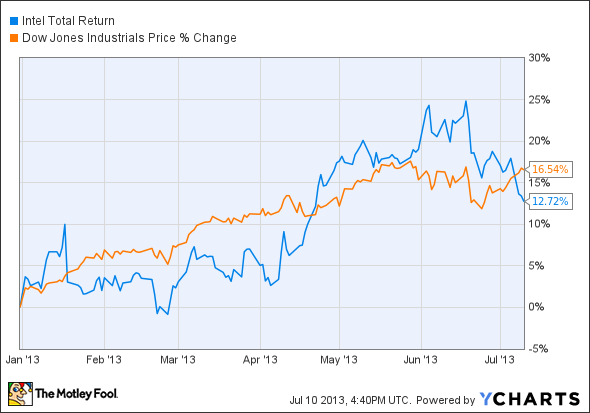Shares of Intel (INTC -1.60%) shrugged off a weak first quarter of 2013 to rally in the second quarter. By mid-June, Intel stock was trading 24.8% higher year to date, soundly beating the Dow Jnes Industrial Average's (^DJI -0.12%) 16.9% gain. But the high didn't last long. Intel came back to Earth over the last week, and now it trails its Dow peers for 2013. The chip giant reports earnings next Wednesday. Is this the right time to buy Intel stock -- or to back away slowly?
INTC Total Return Price data by YCharts.
Let's see. The price plunge over the last few days owes to renewed fears regarding the death of the PC. Not one, but three analyst firms downgraded Intel this week, sending the stock 4% lower overnight. They all questioned Intel's ability to keep margins stable in the swiftly changing market, where the company has missed the boat on tablet and smartphone sales.
Here's where it gets a little weird. The just-released Haswell chip is seen as such a strong bet on mobile markets that this week's skeptics see it cannibalizing higher-margin desktop and server products. Damned if you do and damned if you don't, right? According to this logic, Intel shouldn't try to adapt to new markets, because the old ones are just too comfortably profitable.
Well, the litmus test is about to begin. The new Haswell chips are available today, and they've been chosen to power a handful of brand-name tablets. Dell (DELL.DL) has a $1,200 tablet available with Haswell inside. Hewlett-Packard (HPQ -0.36%) announced Haswell-powered tablets last month. The Dell model runs Windows 8 and doubles as an ultrabook by swinging the screen around. We're still waiting for details on the HP slates, but they're likely to follow Dell into the Windows world.
Intel chips do support the Android operating system, which is more of a proven quantity in the tablet world than anything Microsoft (MSFT -0.66%) has produced, but Windows remains the easiest way to combine tablet and laptop functions.
These tablets may not be game-changers, but they are solid entries into the tablet market by a collection of companies desperate for some success. Dell and HP have tried their hands at tablets and phones before, with disastrous results. Microsoft has been selling smartphone software since before the iPhone boom, but it never broke through to mainstream success. And, as we have already established, Intel sure could use some mobility muscle to make up for dwindling PC sales.
The important thing to notice here is that Intel is finally making the push into mobile computing. The market has matured, some say that smartphone sales have peaked already, and Intel is not making a play for massive growth in an exploding industry anymore. Instead, the company must aim for growing market share in a commoditized market. That sounds a lot like the PC and server markets where Intel has been making hay for decades.
Let me leave you with one more chart. The panic over slow PC sales might lead you to believe that Intel's business is falling through the floor. The reality is nowhere near a drastic plunge, though. Let's see if these stable trends can continue in next week's earnings report. My personal Intel shares are betting that they can.
INTC Revenue TTM data by YCharts.







